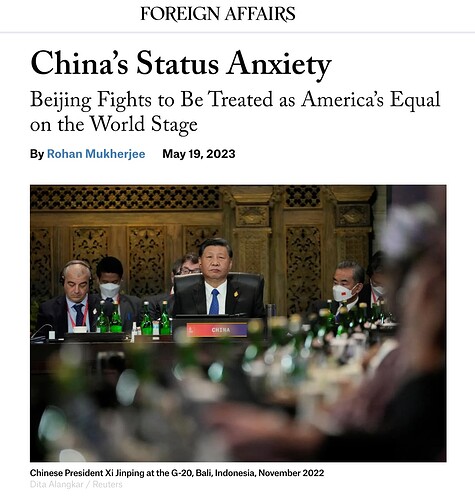-
美国在南卡罗来纳州海岸击落了一个中国侦察气球,中国对此的回应是指责美国的双重标准。
-
随着中国在国际贸易、人权、海商法和军事监控等领域实力的增长,这种针锋相对的回应越来越常见。
-
美国被指责没有遵守自己的自由国际秩序的规则,因此不能批评中国的类似行为。
-
鉴于中国的军事力量比美国弱得多,盟友也比美国少,中国的好战行为是有风险的。
-
对国际秩序中地位的追求促使中国做一些事情,比如在太空项目和核武器上花费数十亿美元。
-
当美国弯曲或破坏国际规则而不允许中国享有同样的特权时,就会产生一种难以忍受的不平等感。
-
中国对国际秩序的态度取决于它在多大程度上被承认并被视为与美国平等的一员。
-
中国更有可能与那些将其置于与华盛顿平等地位的机构合作,而通常对那些不平等的机构提出挑战。
-
因此,国际秩序的持久性取决于美国是否有能力为中国创造足够的基于地位的激励机制来进行合作。
-
由于地缘政治的力量平衡发生了变化,崛起的大国和老牌大国经常发现自己处于碰撞状态,这被称为 “修昔底德陷阱”。
-
通过战争和冲突推翻一个国际秩序是有风险的,代价也很高,不能完全归咎于一个崛起的大国没有发财。
-
伯罗奔尼撒战争就是一个例子,说明崛起大国的地位焦虑导致或加剧了冲突。
-
大国将国际秩序操纵得对自己有利,专注于维持其作为世界政治规则制定者的特权地位,而不仅仅是确保物质利益。
-
崛起的国家寻求加入其所在时代的大国俱乐部,大国政治的真正悲剧不在于它们努力推翻一个物质上不利的秩序,而在于它们的加入会冲淡俱乐部的排他性。
-
大国可以而且确实在迁就崛起的大国,比如19世纪末从英国到美国的霸权转变。
-
崛起的大国从根本上说不容易发生冲突,它们经常与国际秩序合作或试图改革国际秩序。
-
一个机构的开放性和公平性可以表明,现有的秩序能够容纳一个崛起的大国的地位愿望,并将其作为大国俱乐部中的一个平等对象。
-
中国在它认为是公开和程序公正的机构中一直是合作的,如联合国安理会、联合国大会、世界贸易组织、《核不扩散条约》和20国集团。
-
中国对联合国的人权制度提出了质疑,因为它认为这是对中国合法地位的否定,并试图使西方对普遍人权的主张失去合法性。
-
在那些在中国看来只是部分开放或公平的机构中,中国寻求改革以提高自己的地位,并创建和支持新的机构,如亚洲基础设施投资银行和新开发银行,在这些机构中,中国可以成为头牌。
-
中国正在成为一个更加强大的全球参与者,并且正在寻求在 "全球高位 "上占有一席之地。从历史上看,崛起中的大国在为其腾出空间的国际体系中更加合作。美国应该在对国际机构的承诺方面对中国提出更多要求,同时也要进行改革,让中国在全球决策中拥有更大的发言权。
-
美国应该呼吁中国谴责俄罗斯对乌克兰的入侵,用更友好的国家扩大联合国安理会,维持其对世贸组织的承诺,并在朝鲜问题上与西方合作。提出这些要求以换取中国在国际秩序中所期望的地位的提高,将增加成功的可能性。
-
美国也应该让出在国际货币基金组织和世界银行的一些控制权,向中国公民开放领导职位,并在全球缓解和适应气候变化的融资中发挥更大作用。对国际秩序进行这些调整将激励中国在更广泛的问题上进行合作,同时避免疏远这个崛起的大国。
-
The United States shot down a Chinese surveillance balloon off the coast of South Carolina, to which China responded with accusations of US double standards.
-
This tit-for-tat response is becoming increasingly common as China’s power grows in domains such as international trade, human rights, maritime law, and military surveillance.
-
The US is accused of not adhering to the rules of its own liberal international order, and thus cannot criticize China for acting similarly.
-
China’s belligerence is risky given its much weaker military and fewer allies than the US.
-
The pursuit of status in the international order motivates China to do things like spend billions on space programs and nuclear weapons.
-
An intolerable sense of inequality is created when the US bends or breaks international rules and does not allow China the same privilege.
-
China’s approach to the international order depends on the extent to which it is recognized and treated as an equal of the US.
-
Beijing is more likely to cooperate with institutions that place it on an equal footing with Washington, and has typically challenged those that do not.
-
The durability of the international order, therefore, depends on the ability of the US to create sufficient status-based incentives for China to cooperate.
-
Rising and established powers often find themselves on a collision course due to the balance of power in geopolitics shifting, known as the “Thucydides trap”.
-
Overturning an international order through war and conflict is risky and costly, and cannot be solely attributed to a rising power not being enriched.
-
The Peloponnesian War is an example of a rising power’s status anxiety causing or exacerbating conflict.
-
Great powers rig the international order in their favor, focusing on maintaining their privileged position as rule-makers in world politics rather than just securing material benefits.
-
Rising states seek to join their era’s great-power clubs, and the real tragedy of great-power politics is not that they strive to overthrow a materially disadvantageous order, but that their admission would dilute the club’s exclusivity.
-
Great powers can and do accommodate rising powers, such as with the shift in the late nineteenth century from British to U.S. hegemony.
-
Rising powers are not fundamentally prone to conflict, and they often cooperate with or try to reform the international order.
-
The openness and fairness of an institution can signal that the existing order is able to accommodate a rising power’s status aspirations, and treat it as an equal within the great-power club.
-
China has been cooperative in institutions it judges to be open and procedurally fair, such as the UN Security Council, the UN General Assembly, the World Trade Organization, the Nuclear Nonproliferation Treaty, and the G-20.
-
China has challenged the United Nations’ human rights regime, as it views it as a denial of China’s rightful status, and has tried to delegitimize the Western claim to universal human rights.
-
In institutions that are only partially open or fair from China’s perspective, Beijing has sought reforms to enhance its status, and has created and supported new institutions, such as the Asian Infrastructure Investment Bank and the New Development Bank, where it can be top dog.
-
China is becoming a more powerful global player and is looking for a place at the “global high table”. Historically, rising powers have been more cooperative in international systems that make room for them. The US should ask more of China in terms of commitments to international institutions, while also making reforms to give China a greater say in global decisions.
-
The US should call on China to condemn Russia’s invasion of Ukraine, expand the UN Security Council with friendlier nations, maintain its WTO commitments, and collaborate with the West on North Korea. Making these demands in return for China’s desired improvements in its status in the international order will increase the likelihood of success.
-
The US should also cede some control in the IMF and World Bank, open up leadership positions to Chinese nationals, and take a greater role in global financing of climate change mitigation and adaptation. Making these adjustments to the international order will create incentives for China to cooperate on a wider range of issues, while avoiding alienation of the rising power.
